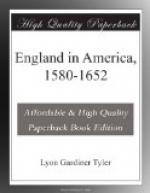The result was a general stir throughout England, and in a few months a thousand persons prepared to leave. They went in several parties in seventeen ships, and there was probably a greater proportion of men of wealth and solid respectability than ever had left England for America in any one year before. The colonists, though Puritans, were church of England men, and the idea of any separation from their old religious connections was expressly disclaimed in a pamphlet published in 1630, entitled the “Planters’ Plea,"[21] which has been, with good reason, assigned to Rev. John White. In this paper the writer appeals to the address of the colonists at their departure, wherein they termed the church of England “our dear mother."[22] Apparently anxious to repel the imputation of nonconformity against “our New England colony,” he adds the confident assertion that John Winthrop, the chosen governor, has been “in every way regular and conformable in the whole course of his practice”; and that “three parts of four of the men planted in New England are able to justify themselves to have lived in a constant conformity unto our church government and orders.”
The party with which Winthrop sailed arrived at Salem June 12, 1630, after a nine weeks’ voyage, in which they were exposed to stormy and boisterous weather. They found the colony of Endicott in “a sad and unexpected condition.” More than a fourth part had died during the previous winter, and many of the survivors were weak and sick. There was a general scarcity of bread and corn, and the arrival of Winthrop and his emigrants did not improve matters, for many of the new-comers were suffering from scurvy, and a quantity of supplies which had been bought in England had by some mistake been left behind.[23]
[Footnote 1: Hubbard, New England (Mass. Hist. Soc., Collections, 2d series, V.), 107, 108.]
[Footnote 2: Planters’ Plea (Force, Tracts, II., No. iii.).]
[Footnote 3: The patent is not preserved, but there is a recital of its main feature in the Massachusetts charter. Poore, Charters and Constitutions, I., 932.]
[Footnote 4: Cal. of State Pap., Col., 1574-1660, pp. 25, 35; Gorges, Description of New England (Mass. Hist. Soc., Collections, 3d series, VI., 75).]
[Footnote 5: Cal. of State Pap., Col., 1661-1668, p. 347.]
[Footnote 6: Gorges, Description of New England, 80.]
[Footnote 7: Hubbard, New England (Mass. Hist. Soc., Collections, 2d series, V., 109).]
[Footnote 8: Bradford, Plimoth Plantation, 314.]
[Footnote 9: Young, Chronicles of Massachusetts, 148; Adams, Three Episodes of Mass. Hist., I., 216.]
[Footnote 10: See charter in Poore, Charters and Constitutions, I., 932.]
[Footnote 11: Young, Chronicles of Massachusetts, 192-200.]




